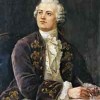Lomonosov Mikhailo Vasilievich
 Lomonosov Mikhailo Vasilievich (8/19.11.1711-4/15.04.1765) is a Russian scientist of genius, poet, educator, one of the most outstanding notabilities of the world science, statesman and public figure.
Lomonosov Mikhailo Vasilievich (8/19.11.1711-4/15.04.1765) is a Russian scientist of genius, poet, educator, one of the most outstanding notabilities of the world science, statesman and public figure.
Lomonosov was grown in a simple and stern conditions. Being a teenager he accompanied his father in deep sea fishing and often faced danger. He learned to read and to write comparatively early. In 1731 Lomonosov stimulated by thirst for knowledge went to Moscow where he won admission to Spasskie school. The years of schooling became a hard cross for him: father’s lashing, “unspeakable poverty”, schoolmates’ mockery. But his talant, excellent studiousness and prompt progress did not stay unnoticable. In 1736 he went to Petersburg as one of 12 best students of Slavic Greek Latin Academy in order to continue his education under the Academy of sciences.
In September 1736 Lomonosov left for Germany (Marburg) to study Chemistry and Mining in the Labaratory of Christian Wolf. Besides Lomonosov had “to learn natural history, physics, geometry and trigonometry, mechanics, hydrautics and hydraulic engineering”. He stayed in Marburg till 1739. There he got extensive and substantial education.
In 1738 student Lomonosov wrote to the Academy a report in German about the attended lectures and purchased books, an essay in Latin on Physics and poetic translation of Phenelone’s ode, glorifying lonely country life. From Marburg the students went to Freiberg to “the mining councellor” Genkel. Their supply was halved and Genkel was charged to keep them more strictly and to inform the keepers of the shops and pubs not to tick them. Fire-blooded Lomonosov quarreled with his mentor and in 1740 left Freiberg without permission of the Academy.
Travelling along Germany Lomonosov got married Elizabeth-Christine Zilch. According to some sources on his way from Marburg to Holland Lomonosov was recruited as a Prussian soldier, but escaped from Vezelya fortress.
In 1741 Lomonosov returned to Petersburg according to the order of the Academy. A year later he was named adjutant to the Russian Academy of Sciences in the Physics department, and in 1745 after departure of Professor Gmelin abroad he was named Professor in Chemistry and stayed at this position for the rest of his life. His activity Lomonosov characterized in 1753 in a letter to Shuvalov: “if someone according to his profession and position gives lectures, makes experiments, harangues, and out of it makes different verses and projects to ceremonial gladness manifestations, compose oratory rules in his native language and the history of his Motherland, I never demand anything else from such person and I’m ready to suffer him in case if it result in something useful”.
In 1757 Lomonosov became a member of Academical office and was joined in management of Academic affaires. In 1759 he was charged to control academical calssical school, University and Geography department. But as status gaining as Lomonosov’s activity were entailed by continuous fight with academical office which was in charge of both economical and scientific and educational affaires, with ruling German party, mason intrigues of G.N. Neplov and other “freemasons” in the Academy, “with enemies of Russian science development who do not allow the implanting of Peter the Great to fructify”. Intensive activity, long struggle with enemy party had ruined Lomonosov’s health early.
Brilliant talent, deep adherence to science, true diligence, flaming patriotism, rigid tenacity are the main features of Lomonosov. As a scientist he was remarkable for unusual wide interests, he enriched physics, chemistry, astronomy, geography, engineering, geology, history, philology with his discoveries, striving for using of science in order of Russia’s development and welfare improvement.
The text is base on materials of site “Нrono”
 Lomonosov
Lomonosov